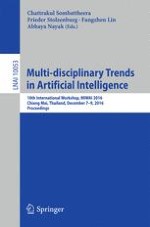2016 | OriginalPaper | Buchkapitel
A Random Forest-Based Self-training Algorithm for Study Status Prediction at the Program Level: minSemi-RF
verfasst von : Vo Thi Ngoc Chau, Nguyen Hua Phung
Erschienen in: Multi-disciplinary Trends in Artificial Intelligence
Aktivieren Sie unsere intelligente Suche, um passende Fachinhalte oder Patente zu finden.
Wählen Sie Textabschnitte aus um mit Künstlicher Intelligenz passenden Patente zu finden. powered by
Markieren Sie Textabschnitte, um KI-gestützt weitere passende Inhalte zu finden. powered by
